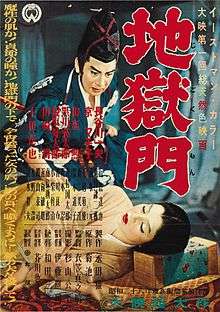Gate of Hell (film)
Gate of Hell (地獄門, Jigokumon, "Gate of Jigoku") is a 1953 Japanese jidaigeki film directed by Teinosuke Kinugasa. It tells the story of a samurai (Kazuo Hasegawa) who tries to marry a woman (Machiko Kyō) he rescues, only to discover that she is married. Filmed using Eastmancolor, Gate of Hell was Daiei Film's first color film and the first Japanese color film to be released outside Japan.
| Jigokumon | |
|---|---|
 Original Japanese poster | |
| Directed by | Teinosuke Kinugasa |
| Produced by | Masaichi Nagata |
| Written by | Teinosuke Kinugasa |
| Starring | Kazuo Hasegawa Machiko Kyō |
| Music by | Yasushi Akutagawa |
| Cinematography | Kōhei Sugiyama |
| Edited by | Shigeo Nishida |
| Distributed by | Daiei Film |
Release date |
|
Running time | 86 minutes |
| Country | Japan |
| Language | Japanese |
Plot
During the Heiji Rebellion in 1159, the samurai Morito desires the lady-in-waiting Kesa, but she is married to Wataru. Morito decides to get rid of his rival. He makes Kesa explain to him how he can kill her husband while he sleeps. Kesa provides very precise instructions, yet when Morito follows through on her plan it is Kesa who gets killed. Morito understands that Kesa has sacrificed herself because she was determined to save Wataru's life and her honour.
Cast
- Kazuo Hasegawa – Morito Endo
- Machiko Kyō – Lady Kesa
- Isao Yamagata – Wataru Watanabe
- Yatarō Kurokawa – Shigemori
- Kōtarō Bandō – Rokuroh
- Jun Tazaki – Kogenta
- Koreya Senda – Taira no Kiyomori
- Masao Shimizu – Nobuyori
- Tatsuya Ishiguro – Yachuta
- Kenjirō Uemura – Masanaka
- Gen Shimizu – Saburosuke
- Michiko Araki – Mano
- Yoshie Minami – Tone
- Kikue Mōri – Sawa
- Ryōsuke Kagawa – Yasutada
- Kunitarō Sawamura – Moritada
Reception
After the Japan Society sponsored a U.S. release of the film in December 1954, Bosley Crowther reviewed it for The New York Times. According to Crowther:[1]
"The secret, perhaps, of its rare excitement is the subtlety with which it blends a subterranean flood of hot emotions with the most magnificent flow of surface serenity. The tensions and agonies of violent passions are made to seethe behind a splendid silken screen of stern formality, dignity, self-discipline and sublime esthetic harmonies. The very essence of ancient Japanese culture is rendered a tangible stimulant in this film."
Awards
Gate of Hell won the grand prize award at the 1954 Cannes Film Festival,[2] a 1955 Academy Honorary Award for "Best Foreign Language Film first released in the United States during 1954", along with the Academy Award for Best Costume Design, Color,[3] and the 1954 New York Film Critics Circle Award for "Best Foreign Language Film". It won the Golden Leopard at the Locarno International Film Festival.[4]
Home video
In the United Kingdom, Gate of Hell was released in 2012 on Blu-ray Disc and DVD as part of the Masters of Cinema line;[5] the next year The Criterion Collection released it in the United States.[6]
See also
- List of jidaigeki films
- List of historical drama films of Asia
References
- Crowther, Bosley (December 14, 1954). "Gate of Hell (1953)". The Screen in Review. The New York Times. Retrieved 2014-09-14.
- "Festival de Cannes: Gate of Hell". festival-cannes.com. Retrieved 2009-01-25.
- "Awards for 1955". IMDb. Retrieved 2014-09-14.
- "Winners of the Golden Leopard". Locarno. Archived from the original on 2009-07-19. Retrieved 2012-08-12.
- Nield, Anthony (2 December 2012). "Gate of Hell". The Digital Fix. Retrieved 2014-09-14.
- Prince, Stephen (April 10, 2013). "Gate of Hell: A Colorful History". The Criterion Collection. Retrieved 2014-09-14.
External links
- Gate of Hell on IMDb
- Jigokumon at AllMovie
- Gate of Hell: A Colorful History an essay by Stephen Prince at the Criterion Collection